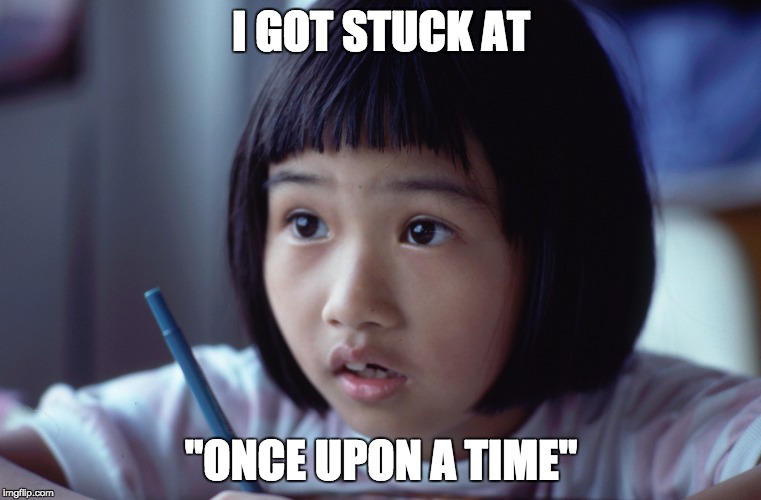Contents
- 1. Write about a shitty bird.
- 2. Put the yucky bits on the side of your plate.
- 3. You can’t lose the plot if you never had it.
- 4. Keep a scene or several in your back pocket.
- 5. Make sure you have a safe place to write OR, learn to write WITH distractions.
- 6. Be accountable.
- 7. Write or die.
- 8. Walk away.
- 9. Keep reading, wait… writing, no wait…reading…
- 10. Set realistic goals for yourself.
- 11. Words of encouragement.
There is a relatively scary statistic floating around the internet that says 97% of people who start writing a novel will never finish it.
Encouraging right?
I’ve not seen this backed up by hard statistics, but I can believe it to be true. The amount of times I’ve had to give myself a kick up the butt (very difficult to physically achieve this by the way) just to get going again, even though I LOVE writing, tells me there will be a lot of quitters.
Yup I used the word ‘quitters’.
A book has this mysterious romantic quality to it, but it’s essentially just a project like any other project. It has a beginning, a middle, and an end.
Ok, sometimes it has a very difficult middle.
But really, it’s no different to mowing the lawn, albeit a very big lawn, and it helps to think of it as not a mountain, but rather a series of smaller hills.
97% of people who start writing a novel will never finish it. Click To Tweet
Here are my 11 tips that will show you how to finish writing your novel:
1. Write about a shitty bird.
As you can tell, I’ve not actually read Anne Lamott’s Bird by Bird, but her phrase “Write a shitty first draft,” is becoming the stuff of legends.
The idea is not that you purposefully write really badly, no that will come naturally.
I kid.
The real idea is that you bulldoze your way through that first draft without the constraint of self-censoring and with serious blinkers on, with the aim of FINISHING.
This is the key.
The enemy is the blank piece of paper/screen, not a shitty first draft.
2. Put the yucky bits on the side of your plate.
As you storm through your novel, achieving the grand ambitions of a finished first draft and Repetitive Strain Injury, you’ll inevitable hit scenes where you just can’t get the words out.
You stop, unsure of whether Johnny got to 1st base or 2nd while making out with Mary-Jane in his dad’s pickup truck.
James Patterson says, write ‘TBW’ on the top of that scene and move on, while trying not to think of how Mary-Jane has lost her innocence.
Be ok with leaving some problems as little nuggets of dilemma that you will sort out later.
You can see where this is going, as you’ll soon end up with something resembling a novel, perhaps with a few holes in the plot.
Be ok with leaving some problems as little nuggets of dilemma that you will sort out later. Click To Tweet
3. You can’t lose the plot if you never had it.
Which brings me neatly to plotting.
I have my own ideas on the debate raging between plotters, those who plan out their novel, and pantsers, those who write by the seat of their pants. (More on that in a later post.)
What is a fact, is that an outline can bail you out when you get stuck. It really is a roadmap that tells you where to go next, especially if you end up skipping sections as we spoke about earlier.
4. Keep a scene or several in your back pocket.
If you have planned somewhat, or if you have a few key scenes that you’re excited about, keep these in your back pocket to pull out in times where you’re stuck. They’re like a pick-me-up on days where you can’t be asked.
They’re like a pick-me-up on days where you can’t be asked.
They can also have unintended and surprising consequences, where the scene might solve an earlier one, or give you a new perspective.
There is further advice that says write your novel’s ending first, but I don’t agree.
The ending is the dessert after the main meal, the carrot stick in front of the donkey. (You’re the donkey in case that isn’t clear.)
My 7-year old has just cottoned onto the idea that he should keep his dessert as a ‘reward’ after making his way through the veg. It really works.
Keep your ending as a reward that gets you through the mushrooms and broccoli of your manuscript.
Keep your ending as a reward that gets you through the mushrooms and broccoli of your manuscript. Click To Tweet
5. Make sure you have a safe place to write OR, learn to write WITH distractions.
On a practical note, the common advice is to find your happy place. Somewhere quiet where you routinely sit down and write.
Then when you are writing, guard yourself from distraction.
Though controversially, would it not be great if you could learn to write WITH distractions? I know a few writers who have managed this. They grab a few hundred words wherever they can, be it with a laptop while the kids are next to them watching telly, or dictating into their phone as they wash dishes.
This little-and-often approach means you then end up with extra words where there would otherwise have been none.
Sure the quality of these words might be dodgy, but that’s what editing is for!
6. Be accountable.
This is where something like Nanowrimo can help, because you’re part of a community of people encouraging each other and comparing word count. I find my local writers circle to serve this purpose for the rest of the year.
Shout out to the Bournemouth Writer’s circle!
7. Write or die.
Not literally. Use this nifty little app. It might spur you on to greatness. I can’t stand it, but I’ve heard it works for some!
8. Walk away.
When you really can’t stand the sight of your manuscript and you feel that tears are close.
Stop.
This is maybe the time to walk away, do something else, go mow the lawn because I know you didn’t finish that job either.
Seriously, you do need to guard your psyche and if things aren’t working, the best thing you can do is to leave it alone for a bit. Perhaps even long enough that you forget some parts of your story. You’ll be amazed that as you return to it afresh sometime later, your muse has returned and you can go on with your very shitty draft.
Distance makes the heart grow fonder right?
9. Keep reading, wait… writing, no wait…reading…
Mr. King said it so it must be true. You can’t write if you don’t read.
I think this is especially true when you’re banging out that first manuscript. Not so that you can compare your writing to that of the books you are reading, but in order to give you fresh perspective and inspiration as you go.
10. Set realistic goals for yourself.
If you set out to write 3000 words a day, but mostly manage 500, you have to adjust your expectations. This will result in you feeling like you’re moving forward and accomplishing something.
Tony Robbins says that:
“People overestimate what they can do in a year and underestimate what they can do in ten.”
“People overestimate what they can do in a year and underestimate what they can do in ten.” Click To Tweet
11. Words of encouragement.
Finally, it’s just a book.
There I said it.
Your worth as a human being is not depended on the quality of the sentence you’re currently agonising over.
This book is also just one of many if you’d like to make a career out of it, so don’t be so damn precious about a first draft.
Write it.
Finish it.
PS. If you found this post useful, entertaining, or it tickled your fancy in ways unimaginable, please consider sharing it via the very helpful buttons below!


Recent Comments